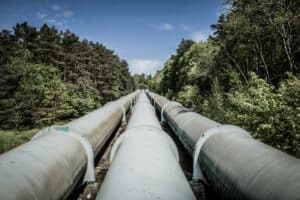The founding of Energy Connections Canada marks an exciting new chapter for our industry. As an alliance for pipeline innovation, our members will be forging new partnerships and collaborations, working together to play a pivotal role in the energy industry and, in particular, the supply of energy.
Here in this blog you can expect to learn about the latest in technologies, innovations and industry developments. But first, let’s start with the basics, taking a look at where the pipeline industry is today, our part in supporting renewable energy, pipeline safety, and the future.
“As we progress towards 2050, I believe we need to take stock of the energy systems that have got us this far, and how critically important they will be in getting us to net zero and beyond,” says Rick Tofani, Executive Director of Energy Connections Canada. “We’re lucky to have energy security here in Canada, but the transformation of energy must be safe, progressive and minimize bumps in the road.
“Pipelines will play a key role in helping to avert potential energy disruptions by providing a safe, efficient, cost-effective, low/no emissions delivery of energy products. That includes their use for conventional products, as we have known them for the last 70-plus years, as well as the new low carbon or decarbonized products that will need to be transported in the future; hydrogen, ammonia, renewables, (and water, too) etc. Not to mention there’s an increasing use of pipelines for moving CO2 as well.
“Do I see a day when pipelines won’t be required anymore? There are some scenarios that are being put out there for sure and once we evolve to a world beyond hydrogen and renewables to fusion, fission, wind, solar and tidal products, it’s possible. But only if we find replacement materials for all of the products/materials that require oil and gas as a feedstock. Just Google “materials produced from oil and gas” and get immersed for an hour or so digging into it – it’s eye opening! However, the answer to my own question at the start of this paragraph is “not likely” and my reason for that is simply because, in the long run, one of the cheapest, most effective and secure ways to ship liquids and gases over short or long distances is through pipelines.”
Pipeline Facts
- In 2023, we have over 840,000 kilometres of transmission, gathering and distribution pipelines in Canada.
- In a 2022 report released by the Canadian Energy Regulator (CER), pipelines accounted for 5.6 per cent (10.7 MT CO2e) of total Canadian greenhouse gas emissions, with the majority of those emissions coming from compressor stations. Many pipeline companies are actively working to reduce their carbon footprint by electrifying compressor stations wherever possible, improving leak detection, and implementing waste heat recovery systems. (Release date 2022-01-12).
- As of 2020, roughly 20 per cent of Canada’s electricity supply comes from natural gas, coal and petroleum products. 50 per cent of Canadian homes are heated by natural gas and another 8 per cent by petroleum and propane products. It is also estimated that 50 per cent of commercial and industrial spaces are heated by natural gas.
- In Canada, 97 per cent of the natural gas and oil we use is delivered by pipelines. Note that these numbers do not include transportation fuels (gasoline and diesel).
- Pipelines have been shown to be the least greenhouse gas (GHG) intensive way to transport oil and gas. In one study, The Faculty of Engineering at the University of Alberta found that pipelines reduced GHG emissions by anywhere between 61 to 77 per cent versus rail for transporting oil and gas long distances.
- Another study by the Fraser Institute shows that pipelines are much safer than rail for transporting oil and gas. This study found that there is a much lower incident rate per million barrels of oil and gas transported for pipelines versus rail. For example, every year between 2003 and 2013, pipelines experienced 0.049 accidents or spills per million barrels of oil, versus 0.227 for rail. In short, this means that transporting oil by pipeline is 4.5 times safer than when done by rail.
Next week in this blog series, we will explore the crucial role pipelines will play in supporting renewable energy. Stay tuned!




